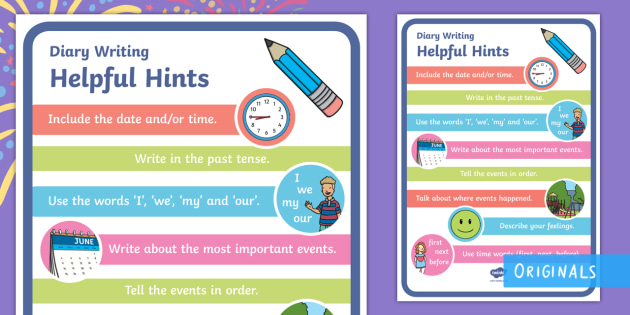Tips on How to Write a Diary Entry
Writing a diary entry is a personal and therapeutic practice that allows you to reflect on your thoughts, emotions, and experiences. Here are some tips to help you make the most of your diary entries:

- Be Consistent: Establish a regular time for writing in your diary. Whether it’s daily, weekly, or whenever you feel the need, consistency helps make diary writing a habit. Having a routine creates a dedicated space for self-reflection.
- Create a Comfortable Space: Find a quiet and comfortable environment where you won’t be disturbed. This could be a cozy corner of your home, a favorite park, or a comfortable chair by a window. Your chosen space should inspire a sense of calm and focus.
- Start with the Date: Begin each entry by noting the date. This simple step provides a sense of chronology to your reflections, allowing you to track the progression of your thoughts and experiences over time.
- Express Your Emotions: Be honest and open about your emotions. Your diary is a safe space for self-expression, so don’t shy away from articulating how you truly feel. Acknowledging and understanding your emotions can contribute to a sense of emotional well-being.
- Detail Significant Events: Highlight the events, encounters, or moments that stood out to you during the day. These details add depth to your entries and create a comprehensive record of your life. Include not only the external events but also your internal reactions.
- Experiment with Styles: Your diary is a creative outlet. Experiment with different writing styles, whether it’s prose, poetry, or bullet points. Let your unique voice shine through, and don’t be afraid to try new ways of expressing yourself.
- Reflect on Challenges and Growth: Write about challenges you encountered and how you navigated them. Reflect on what you’ve learned from these experiences and how they contribute to your personal growth.
- Include Gratitude: Incorporate a section where you express gratitude. Identify and write down things you’re thankful for each day. This practice can foster a positive mindset and appreciation for the positive aspects of your life.
- Read and Reflect: Occasionally revisit past entries. Reflecting on your journey through earlier entries can provide valuable insights into your personal growth, recurring patterns, and evolving perspectives.
- Write Freely: Remember that your diary is for your eyes only. Write without inhibition and judgment. Allow your thoughts to flow freely, and embrace the therapeutic nature of expressing yourself on paper.
Diary Entry: What to Expect?
Diary Entry Prompts
Diary entry prompts serve as catalysts for self-reflection and creative expression, guiding the writer into exploring different facets of their thoughts and experiences. Here are some prompts to inspire meaningful diary entries:
- A Gratitude List: Begin by listing three things you are grateful for today. Explore the emotions associated with each item and reflect on how practicing gratitude influences your overall outlook.
- Letter to Your Future Self: Write a letter to your future self, expressing your current hopes, fears, and aspirations. Consider what advice you would offer your future self and how you envision your life.
- A Snapshot of Your Day: Detail a snapshot of your day, capturing significant events, encounters, and emotions. Reflect on the highs and lows, allowing your diary to become a record of your daily journey.
- A Place That Inspires You: Describe a place that holds special significance for you. It could be a physical location or a mental space. Explore why this place resonates with you and how it makes you feel.
- Reflection on a Challenge: Describe a recent challenge you faced. Explore how it made you feel and what strategies you employed to overcome it. Reflect on the lessons learned from the experience.
- Daily Affirmations: Create a list of positive affirmations for the day. Reflect on how these affirmations influence your mindset and perceptions throughout the day.
- Bucket List Exploration: List three things you want to accomplish or experience in the future. Delve into why these items are on your bucket list and consider the steps you can take to move closer to these goals.
- Memorable Conversation: Recall a recent conversation that left an impact on you. Share the details, the emotions evoked, and any insights gained from the interaction.
FAQS
What is a diary entry?
A diary entry is a personal record of thoughts, feelings, and experiences, typically written in a diary or journal. It provides a private space for self-reflection and expression.
Why do people write diary entries?
People write diary entries for various reasons, including self-reflection, emotional release, memory preservation, creative expression, and personal growth. It serves as a means to document and explore one’s inner world.
What should I include in a diary entry?
A diary entry can include a range of elements such as daily experiences, emotions, challenges, goals, reflections, and personal insights. There are no strict rules; it’s a flexible platform for self-expression.
Should I be concerned about grammar and structure in diary entries?
No, diary entries are personal and subjective. There’s no need to worry about formal grammar or structure. The focus is on genuine expression, allowing writers to be themselves without the constraints of formal writing rules.
Can I share my diary entries with others?
While diary entries are typically private, the decision to share them is personal. Some individuals keep their diaries entirely confidential, while others may choose to share selected entries with trusted friends or family. It depends on individual comfort and intent.
Conclusion
In conclusion, diary entries are personal narratives and reflections that individuals record in a diary or journal. Serving as a private and intimate space, these entries capture the nuances of thoughts, emotions, and experiences. The purpose of maintaining a diary varies, encompassing self-reflection, emotional release, memory preservation, and creative expression. Diary entries are characterized by their flexibility, allowing writers to freely express themselves without concern for formalities. Whether kept entirely private or shared selectively, diary entries are a testament to the unique and evolving journey of an individual.

